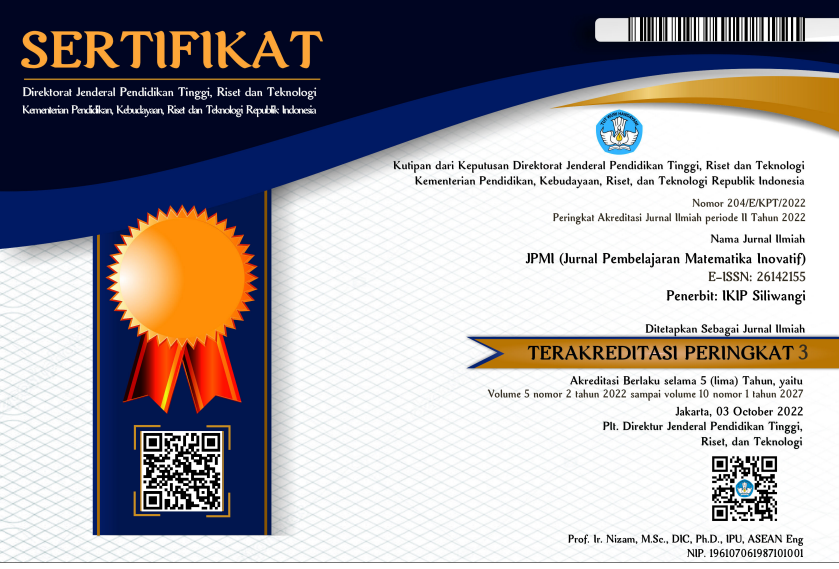ANALISIS KEMAMPUAN KONEKSI MATEMATIS SISWA SMP DITINJAU DARI SELF EFFICACY SISWA
DOI:
https://doi.org/10.22460/jpmi.v1i5.p957-964Abstract
The purpose of this study is to analyze and describe the ability of mathematical connections in terms of self efficacy in Triangle and Segiempat material which is guided by the mathematical connection and self efficacy indicators. This research method is descriptive research by using qualitative approach. This research was conducted in SMP Negeri in Kabupaten Bandung. The subject of this research is the students of class VIII consisting of 20 students. The instrument used in this research is a matter of mathematical connection test, non test in the form of Self efficacy questionnaire, and interview. Based on the conclusions from the results of research and discussion in general can be concluded that the ability of mathematical connections in terms of self efficacy of junior high school students is the difference in the ability of mathematical connections at each level of student self efficacy. The ability of mathematical connections in review of the student's self efficacy indicator that is not met is to apply mathematics in other fields or in everyday life, to understand the equivalent representation of a mathematical concept or procedure, to seek the relationship of various representations of concepts, processes, or mathematical procedures, procedures with other procedures in the equivalent representation. Then for the Student Self Efficacy, in completing each statement given the average student replied that students are afraid of being wrong to work on the problem, and students feel unsure that the student can do the questions given
References
Abdurrahman, S. (1999). Metode Penelitian Suatu Pemikiran dan Penerapan. Jakarta: Rineka Cipta.
Bandura, A. (1997). Self-Efficacy: The Exercise of Control. New York: W.H. Freeman and Company.
Bergeson, T. (2000). Teaching and Learning Mathematics: Using Research to Shift From The “Yesterday†Mind to the “Tomorrow†Mind. Retrieved from http://www.k12.wa.us/research/pubdocs/pdf/MathBook.pdf
Hadin, H., Pauji, H. M., & Aripin, U. (2018). ANALISIS KEMAMPUAN KONEKSI MATEMATIK SISWA MTS DITINJAU DARI SELF REGULATED LEARNING. JPMI (Jurnal Pembelajaran Matematika Inovatif), 1(4).
Hendriana, H., Rohaeti, E. E., & Sumarmo, U. (2017). Hard Skill and Soft Skill Matematik Siswa. Bandung: Refika Aditama.
Huda, N., & Kencana, A. (2013). Analisis Kesulitan Siswa Berdasarkan Kemampuan Pemahaman dalam Menyelesaikan Soal Cerita pada Materi Kubus dan Balok Di Kelas VIII SMP Negeri Muaro Jambi. In Prosiding Pendidikan Matematika PMIPA FKIP Universitas Jambi.
Jatisunda, M. G. (2017). Hubungan Self Efficacy Siswa SMP dengan Kemampuan Pemecahan Masalah Matematis. Jurnal THEOREMS, 1(2), 24–30.
Kurnia, R. D. M., Mulayani, I., Rohaeti, E. E., & Fitrianna, A. Y. (2018). Hubungan Antara Kemandirian Belajar Siswa dan Self Efficacy Terhadap Kemampuan Komunikasi Matematis Siswa SMK. Jurnal Ilmiah Pendidikan Matematika, 3(1), 59–64.
Minarti, E. D., & Nurfauziah, P. (2016). PENDEKATAN KONSTURKTIVISME DENGAN MODEL PEMBELAJARAN GENERATIF GUNA MENINGKATKAN KEMAMPUAN KOMUNIKASI DAN KONEKSI MATEMATIS SERTA SELF EFFICACY MAHASISWA CALON GURU DI KOTA CIMAHI. P2M STKIP Siliwangi, 3(2), 68–83. https://doi.org/10.22460/p2m.v3i2p68-83.629
Moleong, lexy J. (2001). Metode Penelitian Kualitatif. Bandung: Remaja Rosdakarya.
Muchlis, A., Komara, E. S., Kartiwi, W., Nurhayati, N., Hendriana, H., & Hidayat, W. (2018). MENINGKATKAN KONEKSI MATEMATIS SISWA SMP MELALUI PENDEKATAN OPEN-ENDED DENGAN SETTING KOOPERATIF TIPE NHT. KALAMATIKA Jurnal Pendidikan Matematika, 3(1), 81-92.
NCTM. (n.d.). Principles and Standards for School Mathematics. National Council of Teachers of Mathematics. Retrieved from https://www.nctm.org/uploadedFiles/Standards_and_Positions/PSSM_ExecutiveSummary.pdf
Putri, R. I., & Santosa, R. H. (2015). Keefektifan Strategi REACT ditinjau dari Prestasi Belajar, Kemampuan Penyelesaian Masalah, Koneksi Matematis, Self Efficacy. Jurnal Riset Pendidkan Matematika, 2(2), 262–272.
Warih S, P. D., Parta, I. N., & Rahardjo, S. (2016). Analisis Kemampuan Koneksi Matematis Siswa Kelas VIII pada Materi Teorema Pythagoras (p. 2). Publikasi Ilmiah. Retrieved from https://publikasiilmiah.ums.ac.id/handle/11617/6978

















